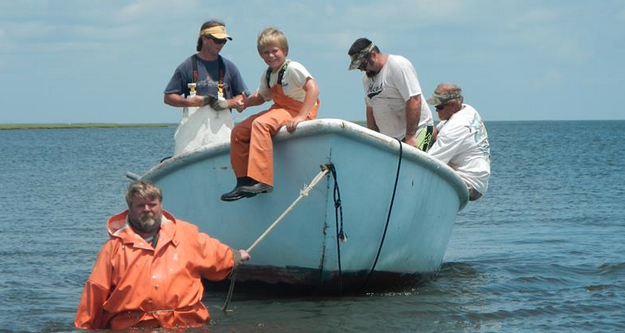CAN COMMUNITY SUPPORTED FISHERIES REVIVE SMALL-SCALE FISHING?

Photo: Core Sound Seafood
North Carolina’s coast has a long tradition of small-scale fishing.
But a globalized economy, pressure from coastal tourism development, rising fuel costs and competition from industrial-scale fishing operations have all meant that many family owned fishing operations have struggled or had to close down.
All is not lost, however, and a number of fishing operations are experimenting with new and innovative ways to get their fish to market and still make a profit. Similar to the subscription-based Community Supported Agriculture (CSA) programs which have helped sustain and revive many family farms across America, Core Sound Seafood is promoting a Community Supported Fisheries (CSF) model, whereby families by a subscription to receive fresh, local seafood delivered from the coast.
Given the seasonality of seafood, Core Sound is offering the following species for the Fall season: Flounder, Drum, Sheepshead, Bluefish, Jumping Mullet, Shrimp, Crabmeat, Clams, Oysters and possibly some offshore fish species that may include Amberjack, Mahi Mahi and Wahoo. All seafood is delivered fresh, not frozen, and is guaranteed to be a maximum of 48 hours out of the water.
There are, of course, challenges to maintaining a truly local supply chain. Because of those challenges, Core Sound does purchase seafood from neighboring states when necessary to maintain supply – but it continues its support of its local fisheries as much as possible as it does so:
We occasionally purchase from regional, small-scale fishermen in Georgia, South Carolina or Virginia to provide species that may not be available in North Carolina state waters due to weather and environmental conditions as well as availability. When this happens, first priority is given to Down East fishers who have traveled to fish in these waters. We strive to be as transparent as possible and will always note in our weekly e-newsletter when items are coming from out of state waters.
With interest in sustainable fisheries growing, and awareness growing of the destruction that over-fishing has wrought on global fish stocks, initiatives like Core Sound Seafood represent a slightly different take on seafood sustainability. Rather than simply focusing on a “check box” list of which species should and shouldn’t be caught, CSF’s promote the notion that the nature of the fishing operations themselves are crucial to how well we preserve our marine heritage, and the communities that rely on it, into the future:
We believe the bottom line is that small-scale fishermen are a tremendous resource in our state’s diverse agricultural offerings, and including them as producers in our regional food shed is vital. We emphasize small-scale as we believe that small-scale fisheries are the most sustainable in that they protect and support marine eco-systems, livelihoods and the larger health of communities.
- Categories: